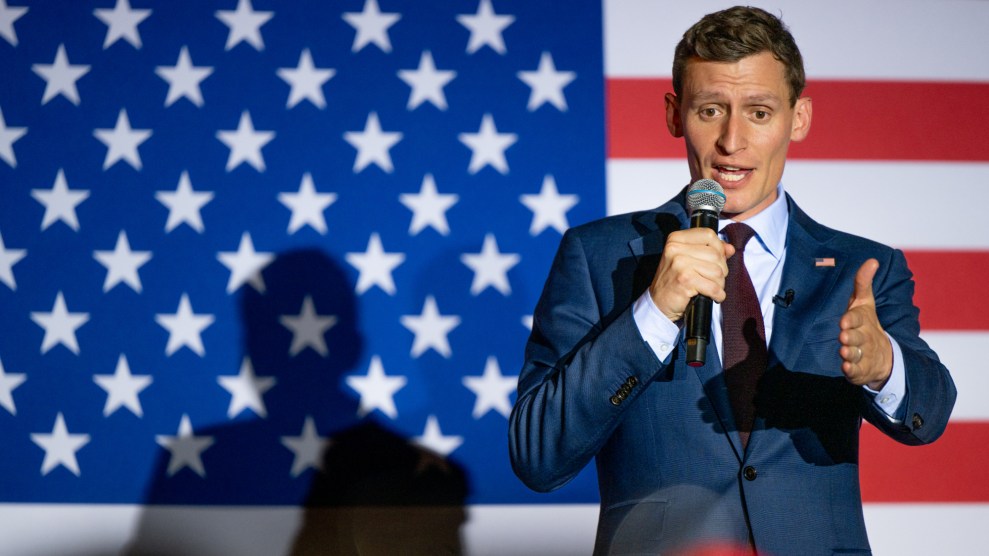
2022 Arizona Senate Candidate and Peter Thiel protege Blake Masters. Brandon Bell/Getty
This morning, Reuters reported that Peter Thiel plans to take a step back from politics in 2024 and will not “fund candidates.” The article cited several of the Silicon Valley billionaire’s close associates anonymously saying that in late 2022 Thiel came to believe that “Republicans are making a mistake in focusing on cultural flashpoints.”
This is a bit baffling. In 2022, Thiel’s handpicked candidates—who also happened to be his former employees—famously combined those “cultural flashpoints” with a protectionist economic message to run on a distinct strain of right-wing populism. Chief among them was Blake Masters, who made a failed attempt at Senate in Arizona. As my colleague Noah Lanard reported, Masters was explicit about the “cultural flashpoints”:
[Masters] called abortion “demonic.” He tweeted that “not everything has to be gay” after a bisexual Superman was announced. He plugged the Unabomber’s manifesto. More half-heartedly, he claimed Trump won the 2020 election.
The Reuters article should be taken with a heavy grain of salt. We have anonymous sources saying a donor—always fickle—won’t invest in candidates in 2024. But this is still a bit hard to understand. The person who donated to Blake Masters thinks the party needs to stop talking about culture war?
The 2022 midterms saw Thiel making the biggest political bets of his life thus far. He was the ninth largest political donor of the election cycle, according to Open Secrets. His donations to J.D. Vance in Ohio and Masters were among the largest individual contributions of last year.
It seemed part of a larger movement and evolution. Thiel started as a Libertarian. He publicly expressed his dissatisfaction with democracy and sought to escape politics and government. He was the type to back longshot libertarian Ron Paul’s campaign in the Republican Presidential primary in 2012. But things changed in 2016.
Thiel bucked Silicon Valley’s center-left political norms and enthusiastically endorsed Donald Trump at the 2016 Republican National Convention. Since the rise of Trump, there has been an effort on the right to reverse engineer a coherent political ideology that can outlast his specific personality cult. This has usually been labeled “National Conservatism.” And Thiel’s money has been central to it.
NatCons, as they’re known, seek to revive American industrial policy and remake the Republican Party into the true home for working people. They combine this with more restrictive immigration policies and “pro-family” social conservatism. Missouri Senator Josh Hawley, elected in 2018 with backing from Thiel, embodies this nascent movement.
In 2022, a lot of Thiel’s money was focused on candidates who fit this mold: Vance and Masters. But maybe it is his return on his investment (the report says it was “late” in 2022 that he decided to, for now, stop funding) that gave Thiel pause. Both the candidates he backed hardest underperformed expectations. Masters lost to Mark Kelly by five points. He finished dead last among Arizona statewide candidates—including people like Secretary of State candidate Mark Finchem, a member of the Oathkeeper militia. In Ohio, Vance was victorious over his Democratic opponent Tim Ryan, but Republican Governor Mike DeWine outperformed Vance by double digits. It was a closer race than many prognosticated.
Perhaps Thiel is saying he is done giving money to candidates for a culture war because he already did. It wasn’t exactly a high-yield bet.

















